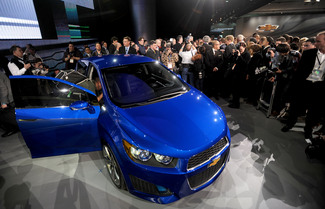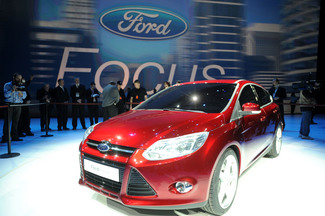Detroit auto show: Consumer demand prompts carmakers to embrace frugality
For the 2010 Detroit auto show, the distressed global auto industry turned its back on far-fetched concept vehicles in favor of something more practical.
Cars that sell.
The automakers have largely dispensed with wild concept vehicles in favor of comparably frugal cars that the average consumer can afford. It makes for less interesting theater but more profitable businesses.
General Motors and Ford are examples of automakers that leveraged high-profile press conferences at the auto show to introduce vehicles for the common consumer - cars they believe to be critical to their future.

The redesigned Chevy Aveo is unveiled at the 2010 Detroit auto show.
Angela J. Cesere | AnnArbor.com
Ford introduced the redesigned Focus, and GM unveiled the redesigned Chevrolet Aveo, for example. Both cars will be relatively affordable and rely on conventional gas engines, though an electric version of the Focus is also under development.
Toyota, too, trained its eye on frugality. The Japanese automaker revealed the FT-CH hybrid concept vehicle, which would cost less than its popular Prius and get better gasoline mileage.
The focus on frugality is a direct response to the contraction in the economy, as consumers pinch pennies and refuse to buy lavish vehicles.
“It’s no secret, the America(n) market has changed dramatically within the past few years and we expect still more shifts in the competitive landscape,” said Mark Fields, Ford’s president of The Americas.
Transitioning to a focus on smaller, cheaper, more fuel-efficient cars is possible partly because of the crisis itself, said David Cole, chairman of the Ann Arbor-based Center for Automotive Research.
The crisis allowed the automakers to reduce labor costs, cut debt through bankruptcies and make their operations more efficient. The domestic automakers have extracted between $4,000 and $6,000 in costs from each vehicle, Cole said.

Ford unveils the new Ford Focus during the 2010 Detroit auto show.
Angela J. Cesere | AnnArbor.com
“We’ve never seen anything like the cost reduction that’s in the process of occurring,” Cole said. “The numbers are gigantic. You can put a lot more value into the small car when you have that kind of cost structure, which means that competitively you can do a pretty good small car, put a lot of value into it and appeal to somebody who doesn’t have a lot of money to spend.”
The average cost of buying a new car has been dropping for years - partly due to better technology, global competition, economic forces and consumer demand.
In the third quarter of 2005, the average new vehicle cost 26.2 weeks of income for the median American family, according to Comerica Bank’s Auto Affordability Index. In the third quarter of 2009, the average new vehicle cost 21.9 weeks of income. That’s the lowest since early 2004, according to Comerica.
|
2010 Detroit auto show
|
For the industry, the conclusion is that affordable vehicles are still selling.
Look no further than Korean automaker Hyundai, whose sales increased 8 percent in 2009 despite the industry’s overall 21 percent decline, said Dave Zuchowski, Hyundai Motor America’s vice president for national sales.
The company’s U.S. market share rose from 3 percent in 2008 to 4.2 percent in 2009, a major increase by industry standards.
Hyundai’s inexpensive offerings include the Accent, which starts just over $10,000. But the automaker’s success isn’t just about cost.
The U.S. Environmental Protection Agency in 2009 said Hyundai had surpassed Honda as the most fuel-efficient auto manufacturer.
“Our ongoing commitment is to remain the most fuel efficient manufacturer in the industry,” Zuchowski said.
But fuel efficiency alone is not enough. Most auto industry experts and executives agree that consumers are increasingly demanding more features, better design and improved fuel efficiency at the same price point.
“Fuel efficiency, driving quality, safety, technology and craftsmanship. To be successful, to be world class, we have to deliver on all of these,” said Derrick Kuzak, Ford’s group vice president for global product development.
Bruce Brownlee, senior executive administrator for external affairs for the 1,100-person Toyota Technical Center in York Township, said “affordability is a big part of our competitiveness.”
But he said some consumers are seeking affordability, fuel efficiency and a roomy vehicle.
“People want that. They don’t want to give up on the size of the car,” Brownlee said.
Contact AnnArbor.com’s Nathan Bomey at (734) 623-2587 or nathanbomey@annarbor.com. You can also follow him on Twitter.


Comments
tracyann
Mon, Jan 18, 2010 : 11:31 a.m.
I wonder how much the price of the Focus will go up now that it's "sportier" looking. It's pretty bad when someone who works for one of the Big Three can barely afford a vehicle they help assemble.
scooter dog
Sun, Jan 17, 2010 : 10:48 a.m.
Talk about a real shocker.I was looking to buy a full size pick-up truck for my business.WOW,WOW sticker shock.I bought a 2006 chevy pick-up truck and with all the discounts I paid around$ 14.000 dollars.Same truck 3 yrs later same everything pushing $26K Sorry,too rich for my blood.I can see why there not selling.Who in there right mind would do a 7 yr vehicle loan.